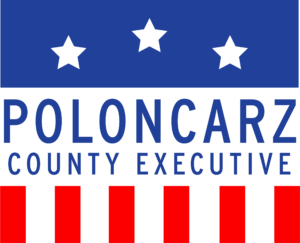By Robert J. McCarthy
NEWS POLITICAL REPORTER
An experiment to hire part-time workers for full-time Erie County jobs continues to cause controversy as County Comptroller Mark C. Poloncarz now contends that the Collins administration paid such employees for lunch on holidays.
Poloncarz, a Democrat who will challenge Republican County Executive Chris Collins in November, said Monday that his audit of an agreement between the administration and the county’s white-collar union over an employment category called “regular part-time” revealed more than $25,000 in overpayments.
Coupled with about $14,000 in underpayments for vacation, sick time, holidays, summer hours and personal leave time, Poloncarz said, the county gave those employees more than $11,000 above what they were owed.
“Maybe the reason the county executive can’t find enough money in the budget for parks workers, librarians or rodent-control officers is because the county has been wasting it on things like incorrectly paying employees for lunchtime on holidays,” the comptroller said.
Personnel Commissioner John W. Greenan disputed Poloncarz’s numbers, saying that negotiations with the union eventually resulted in a savings of $770,000 for the county. “That’s what we were ultimately able to negotiate,” he said. “His claim that this cost the county money is not the case.”
Soon after taking office in 2008, Collins aimed to save money by establishing the “regular part-time” employment category for employees who usually worked about 20 hours a week and received half the paid leave of unionized full-time employees. Collins figured he would place “RPTs” in jobs that were historically considered full time.
He planned to schedule the part-timers up to 39 hours a week while giving them half the paid time off, as well as the customary half-day’s pay for holidays and other days off.
Local 815, Civil Service Employees Association, challenged him and won before the state Public Employment Relations Board, then in State Supreme Court and eventually in its Appellate Division. In February, a five-judge appellate panel unanimously ordered Collins to make the employees whole — as though they had been 40- hour employees from their starting date.
Poloncarz said the idea cost the county about $450,000 in back pay in addition to the amount his audit discovered. He noted that because many of the payments to RPT employees were calculated at their current wage rates, even though much of the time earned was before 2011 at a lower wage rate, they resulted in higher cash-out awards than would have been earned at the time.
Greenan said that the $11,000 was a mistake but that it was part of a segment of the agreement that netted the county $450,000. And he emphasized that despite the court ruling, negotiations resulted in a net gain of $770,000 for the county.
Joan A. Bender, president of Local 815, was unavailable to comment.
Poloncarz said overpaid employees will pay back their money according to county policy, while underpaid employees will be compensated during future pay periods.
